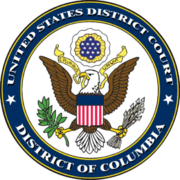Federal Trade Commission v. Facebook
| Federal Trade Commission v. Facebook, Inc. | |
|---|---|
 | |
| Court | United States District Court for the District of Columbia |
Federal Trade Commission v. Facebook is a United States court case in which the Federal Trade Commission made claims about Meta Platforms, Inc. (previously known as Facebook, Inc.) regarding United States antitrust law.[1]

On December 8, 2020, the Federal Trade Commission, along with 46 US states (excluding Alabama, Georgia, South Carolina, and South Dakota), the District of Columbia and the territory of Guam, launched an antitrust lawsuit against Meta. The lawsuit concerns Meta (Facebook's parent company) and its acquisition of two competitors - Instagram and WhatsApp - and the ensuing monopolistic situation. FTC alleges that Meta holds monopolistic power in the US social networking market and seeks to force the company to divest from Instagram and WhatsApp to break up the conglomerate.[2] William Kovacic, a former chairman of the Federal Trade Commission, argued the case will be difficult to win as it would require the government to create a counter factual argument of an internet where Meta did not exist, and prove that it harmed competition or consumers.[3]
The Federal Trade Commission said that Meta's actions prevent consumers from enjoying the benefits of competition.[4]
On June 28, 2021, the U.S. District Court for the District of Columbia dismissed the FTC's complaint, as legally insufficient.[5] A December 2021 New Yorker profile of Lina Khan, the Biden-appointed head of the FTC, describes the court's decision as "a harsh criticism of how Khan's predecessors [the Trump-appointed FTC Commissioners] had written their complaint." According to the article, the decision argued that the FTC "had provided no proof for its assertion that Facebook held a monopoly position in social networking, but, instead, seemed to assume that everyone simply saw it that way."[6]
On January 11, 2022, addressing a new amended complaint from the FTC, the U.S. District Judge presiding over the case, James E. Boasberg, denied Meta's motion to dismiss the case. Meta sought dismissal on grounds including that Khan should have recused herself from the vote of FTC commissioners to file the case, on the basis of her previous writing as a scholar and an analyst, which allegedly showed bias against Meta.[7][8]
References[]
- ^ Kang, Cecilia; Isaac, Mike (9 December 2020). "U.S. and States Say Facebook Illegally Crushed Competition". The New York Times.
- ^ Feiner, Lauren; Rodriguez, Salvador (8 December 2020). "FTC and states sue Facebook, could force it to divest Instagram and WhatsApp". CNBC. Retrieved 8 December 2020.
- ^ Brian Fung. "The legal battle to break up Facebook is underway. Now comes the hard part". CNN. Retrieved 2020-12-10.
- ^ Kendall, Brent; McKinnon, John D. (10 December 2020). "Facebook Hit With Antitrust Lawsuits by FTC, State Attorneys General". Wall Street Journal.
- ^ Rodriguez, Salvador (28 June 2021). "Judge dismisses FTC and state antitrust complaints against Facebook". CNBC. Retrieved 13 January 2022.
- ^ Kolhatkar, Sheelah (29 November 2021). "The Enforcer: Lina Khan's battle to rein in Big Tech". The New Yorker. No. December 6, 2021. Retrieved 14 January 2022.
- ^ Bartz, Diane; Shepardson, David (11 January 2022). "U.S. judge rejects Facebook request to dismiss FTC antitrust lawsuit". Reuters. Retrieved 13 January 2022.
- ^ Frankel, Alison (12 January 2022). "Facebook judge rejects argument for FTC chair's recusal: 'Courts must tread carefully'". Reuters. Retrieved 13 January 2022.
External links[]
- Facebook litigation
- United States Court of Appeals for the Ninth Circuit cases
- United States antitrust case law
- 2020 in United States case law
- Federal Trade Commission litigation
